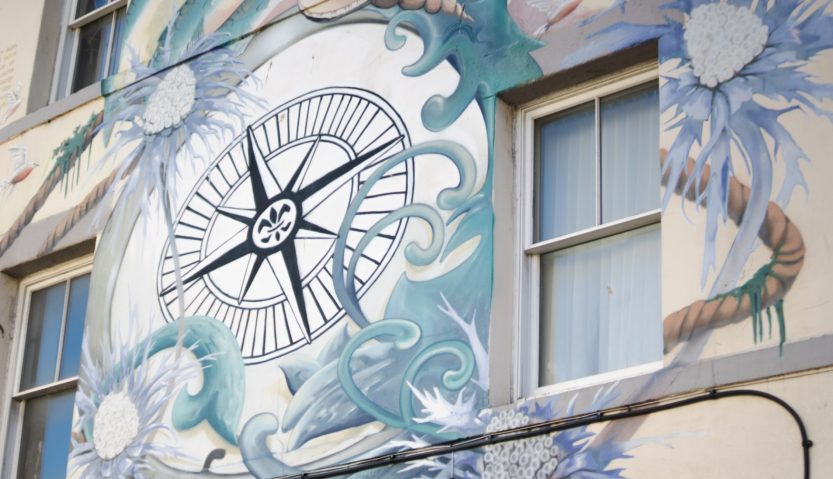Making the case for a new Eden: Interview with Graeme Collinge
March 2023 | Hannah MayoIn January 2023, as part of the Governments latest round of Levelling Up Funding, Eden Project North was announced as the flagship project. With an award of £50 million Eden Project North is destined to be a nationally important project that will transform both the landscape and economic fabric of Morecambe and indeed the wider North West’s visitor economy for generations to come. With the Chancellor reportedly saying that the Eden North bid was ‘the best by a long way’ we hear from Graeme Collinge, Genecon’s joint Managing Partner who led Genecon’s work on the business case and the successful LUF2 bid

HM: So, how did your work on Eden Project North come about?
GC: In 2020 we were approached to assist the Eden partners (Eden Project International, Lancaster City Council, Lancashire County Council, Lancaster University and Lancashire LEP) with the preparation of the business case for Eden Project North after an initial business case by one of the Big Six firms was pushed back by HM Treasury analysts seeking a revised approach to the economic case to ensure compliance with HM Treasury’s Green Book. They were particularly looking for the Land Value Uplift approach to be used, an area we specialise in.
HM: Was it just a rework of the BCR (benefit cost ratio) modelling then or was it more complex than that?
GC: The redevelopment of this business case was one of the most technically comprehensive business cases that Genecon have ever manage as it required the co-ordination of 13 specialist sub-consultant inputs. The project involves a £100m investment to transform a strategically important but derelict site on Morecambe’s seafront to create a world class cultural and tourism destination. Historically Morecambe’s leisure destination site, it has been waiting for something with the transformational scale of Eden Project North for more than 20 years.
We were also conscious that, due to the scale and profile of the project, it would receive significant public and political attention on both a national, perhaps even international platform. Its business case therefore needed to present a very compelling rationale for public sector support.
HM: The work Genecon did was obviously well received. Is that where your involvement ended then?
GC: No, not at all. Our work continued with the Eden partners through 2021 and into 2022 with Genecon working with the partners to develop their Levelling Up Round 2 funding application for £50m. The Government’s guidance indicated that the second round of the Levelling Up Fund would make two £50m Cultural project awards so competition was likely to be fierce. Bid preparation was just at a time when the UK’s economic and political landscape was also very unpredictable so collectively as a team we had to continually adjust and adapt our approach, building and compiling all the technical evidence needed to support the bid. I very much saw it as our role to ensure the bid was as comprehensive and compelling as possible; the strategic rationale and economic justification robust, providing the foundation around which a successful award by the politicians could then be made.
HM: It sounded like a lot of hard work went in. Was it all worthwhile?
GC: Absolutely, it was, and is one of the most rewarding projects I’ve ever worked on in my career to date. Eden Project North was announced as successful in January 2023, even including a Prime Ministerial visit to Morecambe. With the Chancellor understood to have verbally indicated that the Eden North bid was ‘the best by a long way’ we can be extremely proud of our work and contribution.
HM: What was different and do you mind sharing your secret to success?
GC: It was down to a really strong working partnership with the Eden partners, and the gaining I think of their trust in our ability to co-ordinate all the technical work that would be needed. Our approach to Eden Project North, as in all of our business case preparation, uses an established set of questions for each of the 5 cases to ensure that once a business case gets to appraisal or assurance stage it offers a high level of evidence to underpin the assumptions that then drive:
1) The presentation of an exciting and unique project that will make a real difference to its local economy;
2) A really strong, broad ranging rationale for investment;
3) An excellent Value for Money proposition and Benefit Cost assessment, and
4) Strong deliverability credentials.
We started by breaking down the Work Strands and individual tasks, identifying the evidence that would need to be compiled into a detailed activity programme. This programme was then used at client/consultant progress meetings for discussing and monitoring progress (both client and consultants’ sides).
The really important part of our work was to galvanise the client partners around agreement to a 16-strand set of arguments to the Strategic Case; a complicated set of funding and scale options that would be modelled at the heart of the Economic Case, and to set out and explain to the partners how the Economic Case would be constructed to address analysts’ likely issues. The key would be to follow Green Book methodology to ensure that this was based around Land Value Uplift, supported by a wider set of benefit outcomes that could demonstrate how the project will tackle local deprivation. Amir, one of our specialist accountants/financial modellers then worked with the Eden team to ensure that their financial revenue/operating costs model was sound and could be relied upon to help with analysis of the impact of different funding mixes (grant, loan, philanthropy) on the EBITDA output from the model (to demonstrate financial sustainability). This enabled not only the use of the project’s financial model within the Financial Case, but it became a critical tool integrating it at the heart of the Economic Case and the set of options and sensitivities tested to demonstrate the Project’s sustainability.
HM: So how did you approach producing the evidence base for the Commercial and Economic Cases?
GC: Great question. As part of the evidence gathering, we managed the appointment of leisure consultants, Subsidy Control lawyers, and an important review by Avison Young on the impact on property values around Eden Project Cornwall over the past 20 years and then projections from this analysis for Eden Project North. Both reports provided key evidence underpinning the Commercial and Economic Cases. For the Management Case, we worked with Eden’s specialist project management company and internal team to build a robust delivery case.
Will there be any more work with the Eden team now they’ve received the green light?
GC: I very much hope so. When you know that you and your client team have work so hard on a project, it is great to get a successful funding award. However, the real reward is still to come – to see Eden project North open on Morecambe’s seafront; seeing it integrate into the physical and economic fabric of the town and knowing that we played our part in the transformation that will follow. There is still much work to be done, and we are continuing to work with the Eden partners as the project moves from LUF announcement to funding agreement including the need to take the project through the Government’s new Subsidy Control checks via the Competition and Markets Authority. Nothing is easy for a project of the scale of Eden Project North, but meeting the challenges head on is always part of the thrill of bringing a major project through to delivery.
HM: Thank you, Graeme.
< Back to News, Views & Insights
More articles
What do the UK political parties have to say about placemaking?
19th June 2024The publication of Reform UK’s manifesto on Monday 17th June saw the last of the main UK-wide political parties release their proposed legislative pitch to the national electorate ahead of the General Election on Thursday 4th July. Now whilst much of the commentariat have understandably tended to hone in on the respective political parties’ plans […]

Making the most of the Three Investment Themes
24th April 2024The £20m endowment-style funding provided to Town Boards through the Long-Term Plan for Towns programme to allocate across three investment themes over the next decade represents a place-based approach to levelling-up which is forward-looking and agile in its approach. Whilst there is no requirement on how towns utilise funding across the three investment themes, the […]

What does art mean to you?
15th April 2024Many people think of art as painting, drawing – the visual arts you go to a gallery to see. But art is much more than that – its any object or experience that communicates an idea, an emotion, or a view of the world, and it can take many forms. ‘Art isn’t just what we […]